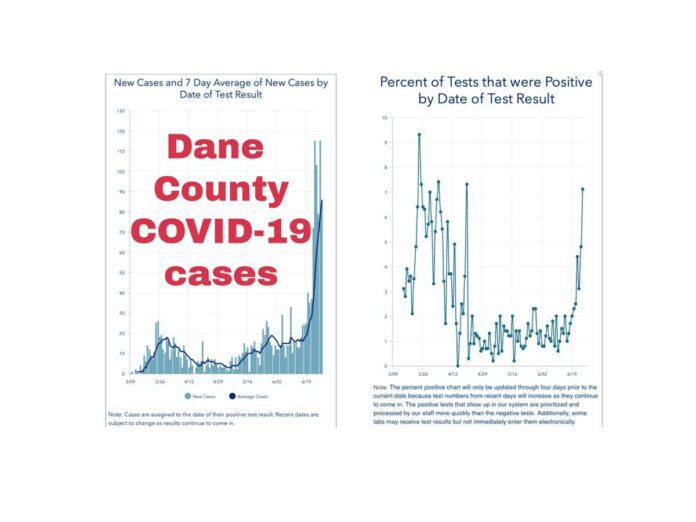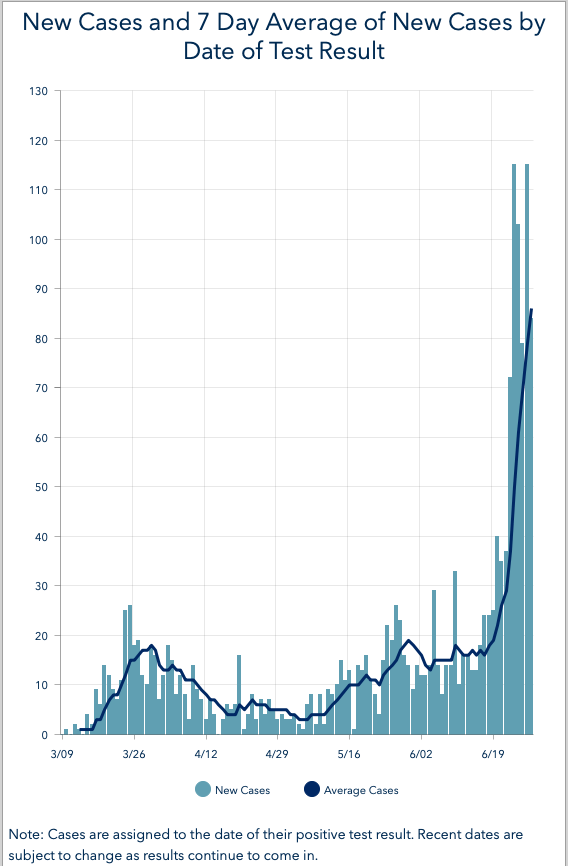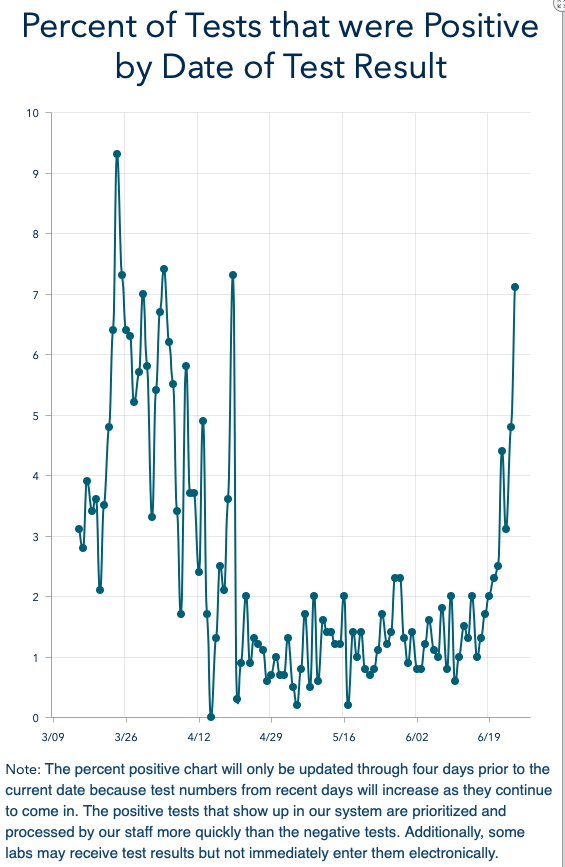So, the Dane County numbers are going up, up and up (4 to 5 times more new cases) and the percentage of test coming back positive are like they were end of March and beginning of April. But there’s no going back . . .only forward.THE NUMBERS
The most recent numbers change, yesterday is said there were only 99 cases yesterday, now it says 115, but its been reported there were 90 or 120 (originally it said 120) or 125. The numbers usually go up the next day. Here’s the number of new cases in Dane County from the lastest numbers at 9:30am this morning.
The reports of reaching 7% positive test rates are from 4 days ago. I expect the numbers will also go up as they add info for the past 4 days.
We are most definitely trending the wrong way.
578 cases in the last 6 days, 1751 cases total, which means 33% of the cases have been diagnosed in the past 6 days of the pandemic. 15% are asymptomatic.
WHY WE AREN’T REQUIRED TO WEAR MASKS IN PUBLIC IN DANE COUNTY
Alder Marsha Rummel posted this in response to a Facebook post by Wendy Schneider in which I was tagged:
DATE: May 29, 2020
TO: Mayor Rhodes-Conway, Members of the Madison Common Council
FROM: Janel Heinrich, MPH, MA, Director, PHMDC
SUBJECT: Mandatory Masking in Madison
The guidance offered in this memo around wearing masks and cloth face coverings is based on a review of the best scientific knowledge available at the time of writing. The novel coronavirus or COVID-19 is just that – novel. The public health community and scientists around the world are learning about this virus and guiding a public response at a rapid pace. The information below represents some of what is currently known about the efficacy of wearing masks and face coverings in public settings as well as the many social considerations that should be taken into account in passing policy, enforcing, or making personal choices related to the use of face coverings.
At the beginning of this pandemic, there were shortages of personal protective equipment (PPE) that was critically needed in medical settings and other essential businesses. Those shortages contributed to early guidance asking that members of the public not buy and use masks that were needed for medical uses. As systems for creating and distributing washable cloth face coverings and disposable masks have increased in capacity; and as the use of cloth face coverings have been found to be an effective tool in slowing the transmission of the COVID-19 virus, the guidance around when they should be worn and by whom has shifted. While it is still recommended that N95 masks be reserved for medical uses, the Centers for Disease Control and Prevention are now recommending that when possible individuals wear cloth face coverings in public settings.
COVID-19 spreads mainly from person to person through respiratory droplets produced when an infected person coughs, sneezes, or talks. These droplets can land in the mouths or noses of people who are nearby or possibly be inhaled into their lungs. “Studies and evidence on infection control report that these droplets usually travel around 6 feet”i1 While people who are symptomatic or have tested positive for COVID-19 will hopefully follow guidance to stay home and avoid transmitting the virus, recent studies have highlighted that the COVID-19 virus has been so effective in its transmission between hosts because of asymptomatic transmission. Best available data tells us that about 15% of individuals who have tested positive for COVID-19 in Dane County are asymptomatic. Wearing a face-covering while in public when a 6-foot physical distance cannot be maintained slows the transmission of the virus by reducing the likelihood that the symptomatic or asymptomatic wearer will spread the virus. Wearing a mask can also provide a visual cue, reminding others to maintain their physical distance.
As such, Public Health Madison & Dane County highly recommends wearing cloth face coverings in public settings where physical distancing measures are difficult to maintain, however, they are not a replacement for physical distancing and other preventive measures, which should always be taken to ensure safety. Cloth face coverings are especially recommended in indoor settings, but are not recommended for children under 2 years of age, or anyone who has trouble breathing.
While cloth face coverings can prevent the wearer from spreading the virus, there are valid reasons that may prevent an individual from wearing a cloth face covering and PHMDC does not recommend requiring or ordering individuals to wear cloth face coverings outside of certain employment spaces.
Some health conditions may keep individuals from being able to wear a cloth face covering. These might include chronic conditions such as dementia or Alzheimer’s, autism spectrum disorder, or COPD/emphysema; wearing a face covering may be challenging, dangerous, or stressful for individuals with disabilities. In addition to medical considerations, individuals may not feel safe wearing a mask for many reasons including emotional, behavioral, and trauma experiences. Individuals may also fear racial profiling or discrimination based on wearing – or not wearing – a face covering. Another reason why PHMDC does not recommend requiring or ordering face coverings is access to clean, multiple, or appropriate face coverings may vary based on socio-economic status.
Requiring cloth face coverings or masks to be worn by the public may lead to potentially problematic, albeit likely unintentional, consequences. Potential consequences of implementing mandatory masking may include:
-
-
- loss of wages, if the employer does not consider reasons why masking may not be an option for that individual;
- limiting access to certain business spaces such as grocery access, which could lead to increased food insecurity;
- or generally requiring individuals to choose between their safety or being able to access spaces that support their ability to access basic needs, as some examples.
-
Additional problematic consequences of requiring cloth face coverings to be worn in public relate to concerns surrounding enforcement. The enforcement of masking requirements have resulted in violence in other parts of the country, both between police and private citizens – this is most certainly not something that we want to see in Madison and Dane County. Using local law enforcement resources to enforce face covering requirements would detract from their ability to support other safety and public service roles.
Furthermore, enforcement efforts that include fines have resulted in financially penalizing individuals in a climate when many are already financially stretched. We know that any system that is complaint-based will disproportionately penalize those who are marginalized from systems of power. Any decision to require cloth face coverings should be done with consideration of these potential harms along with weighing the benefits related to transmission of the virus.
While businesses and organizations may make decisions about requiring cloth face coverings based on what is best for their space, use, and community, the Forward Dane plan requires that all businesses unable to assure physical distancing must provide some type of protective shield between individuals or they must provide face coverings for employees. If a business or other public or private space decides to require or recommend that a cloth or disposable face covering be worn, they should provide them, free of cost, to both customers or space users and staff. It is also important that the business or organization make and advertise a plan for flexibility and accommodation for anyone who is unable to wear a face covering. The ADA requires businesses to provide reasonable accommodations to continue providing services to individuals unable to safely wear a face covering.
In short, individuals who are able to wear masks or cloth face coverings are highly encouraged to do so anytime when they will not be able to maintain a 6-foot physical distance from others. Wearing cloth face coverings is an effective method of slowing the transmission of the COVID-19 virus; doing so is an act of compassion and caring for the community. Similarly, understanding that not everyone will be able to wear a face covering can also be a form of compassion and of the experiences of others in our community.
THERE HAS TO BE A MIDDLE GROUND
Require the masks, require the businesses to provide them if people don’t have one, allow for exceptions for those who can’t wear a mask for whatever reason, give people warnings and education, not tickets for not wearing them.
The city needs to send a strong, clear message that they are required. Of course, that would mess with the restaurants and bars . . .since you can’t wear a mask (that I know of . . . while eating and drinking. Wear a face shield?
Any which way, I know the city and county only want to move forward, but there has to be a plan for going backwards . .. especially if these numbers continue to climb.









